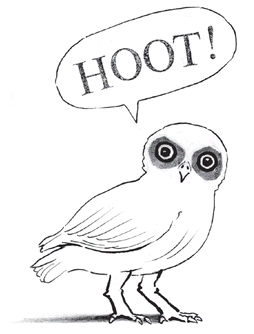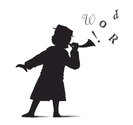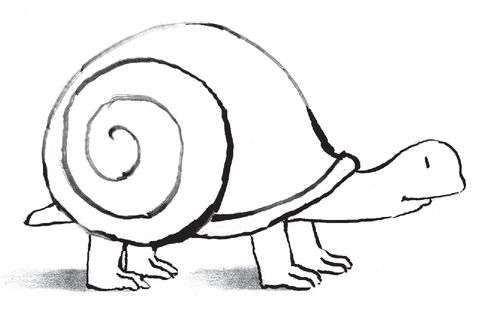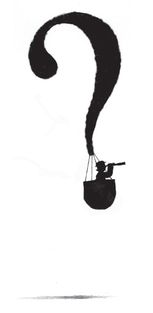The Word Snoop (14 page)
Authors: Ursula Dubosarsky

Onomatopoeia

 Tongue Twisters
Tongue Twisters


WOW!
That’s a hard word!
Ono-mato-pee-a.
Hmm. Actually, you probably use onomatopoeia every day. Like when you
crunch
on a very juicy apple and
slurp
as you lick all the juice from your face, or listen for the
brrring
of the bell when school’s over (at last!).
That’s a hard word!
Ono-mato-pee-a.
Hmm. Actually, you probably use onomatopoeia every day. Like when you
crunch
on a very juicy apple and
slurp
as you lick all the juice from your face, or listen for the
brrring
of the bell when school’s over (at last!).
The word
onomatopoeia
comes from ancient Greek.
Onoma
means “name,” and
poeia
means “making.” Onomatopoeia is when you use a name or word that makes the sound of something, or at least suggests it somehow. For an easy example, remember the fights in
Batman
?
POW! WHAM! SMASH!
That’s onomatopoeia. Comic-book writers love it. In fact, there’s even an evil comic-book character called Onomatopoeia, who gets his name by imitating sounds, like the dripping of a faucet or a gun going off. (Keep away from him!)
onomatopoeia
comes from ancient Greek.
Onoma
means “name,” and
poeia
means “making.” Onomatopoeia is when you use a name or word that makes the sound of something, or at least suggests it somehow. For an easy example, remember the fights in
Batman
?
POW! WHAM! SMASH!
That’s onomatopoeia. Comic-book writers love it. In fact, there’s even an evil comic-book character called Onomatopoeia, who gets his name by imitating sounds, like the dripping of a faucet or a gun going off. (Keep away from him!)
The words for animal sounds often use onomatopoeia, like
moo
for a cow, or
quack
for a duck. But the funny thing is, even though animals sound much the same all over the world, people who speak different languages make up different words for the sounds animals make. So, for example, in English a pig goes
oink oink,
but in Chinese it’s
hu lu,
in Croatian it’s
rok rok,
and in Portuguese
croinh croinh.
An Indonesian dog goes
gong gong,
a Russian dog
gav gav,
and an Albanian dog
hum hum.
Try that out next time you sing “Old Macdonald Had a Farm!”
moo
for a cow, or
quack
for a duck. But the funny thing is, even though animals sound much the same all over the world, people who speak different languages make up different words for the sounds animals make. So, for example, in English a pig goes
oink oink,
but in Chinese it’s
hu lu,
in Croatian it’s
rok rok,
and in Portuguese
croinh croinh.
An Indonesian dog goes
gong gong,
a Russian dog
gav gav,
and an Albanian dog
hum hum.
Try that out next time you sing “Old Macdonald Had a Farm!”

And it’s not just the animals. If you’re in Japan and someone cracks a joke, make sure you don’t say “ha ha ha,” because in Japan it’s
hu hu hu.
Or if you’re in Poland and you feel a big sneeze coming on, don’t say “aah-choo!” when you sneeze, say
apsik!
And luckily when the Word Snoop was in Bulgaria last summer and someone stepped on her toe, she remembered just in time to cry out
“Ox!”
hu hu hu.
Or if you’re in Poland and you feel a big sneeze coming on, don’t say “aah-choo!” when you sneeze, say
apsik!
And luckily when the Word Snoop was in Bulgaria last summer and someone stepped on her toe, she remembered just in time to cry out
“Ox!”
Poets are especially fond of onomatopoeia, where the sounds and the meanings of words go together. What do you think the writer Edgar Allan Poe, famous for his scary stories and poems, was talking about here?
“How they
tinkle, tinkle, tinkle,
In the icy air of night!”
tinkle, tinkle, tinkle,
In the icy air of night!”
(No, not daggers—think
ding dong
. . .)
ding dong
. . .)
In
The Giants and the Joneses
by Julia Donaldson, the giants speak a language that the author made up herself called “Groilish,” with words like
heehuckerly
for “funny” and
glishglursh
for “splash.” And in Roald Dahl’s
The BFG
(yes, that’s an acronym), there are words like
frobscottle
and
trogglehumpers
. What do you think they could mean?
The Giants and the Joneses
by Julia Donaldson, the giants speak a language that the author made up herself called “Groilish,” with words like
heehuckerly
for “funny” and
glishglursh
for “splash.” And in Roald Dahl’s
The BFG
(yes, that’s an acronym), there are words like
frobscottle
and
trogglehumpers
. What do you think they could mean?
You could make up some words like this. It could be giants talking, or it could just be based on something ordinary, like a ride on a tram or a train or a bus. To give you an idea, ask your grandparents or a VERY old teacher if they can sing you “The Trolley Song,” made famous by the singer Judy Garland. It’s got
clangs
and
dings
and
zings
and
chugs
and
bumps
and
buzzes
as well.
clangs
and
dings
and
zings
and
chugs
and
bumps
and
buzzes
as well.
In the meantime, see if you can work out what the onomatopoeic words on the opposite page could be.

Onomatopoeia
1.
A game you play with two bats and a lightweight ball across a table. (Don’t hit too hard!)
A game you play with two bats and a lightweight ball across a table. (Don’t hit too hard!)
2.
The sound a snake makes. (Leave the room very quickly when you hear this sound.)
The sound a snake makes. (Leave the room very quickly when you hear this sound.)
3.
A bird you might find in a wooden clock. (Not exactly alive.)
A bird you might find in a wooden clock. (Not exactly alive.)
4.
When you talk in a very low voice. (As you always should. Ha ha! Or should I say hu hu?)
When you talk in a very low voice. (As you always should. Ha ha! Or should I say hu hu?)
Say the following sentence as fast as you can three times.
Betty Botter bought a bit of bitter butter.
Not bad. Now try:
Bobby Blue blows blue bubbles.
Or even just:
Mixed biscuits, mixed biscuits.
Did you notice what happens to the words? For most people, the words all start to tumble together and trip over each other. This is something called a tongue twister. Tongue twisters are fun sentences or phrases that are hard for your tongue to say, especially if you try to say them quickly.
Your tongue is a very important part of your mouth for making sounds of words. Tongue twisters are tricky because they use words that repeat similar sounds. Look at all the
b
’s and
it
’s in
B
etty
B
otter
b
ought a
bit
of
bit
ter
b
utter
. And the
i
and
s
and
x
sounds in
m
ix
ed b
is
cuit
s
.
When similar sounds come close together over and over again, our tongue and our brain get mixed up.
b
’s and
it
’s in
B
etty
B
otter
b
ought a
bit
of
bit
ter
b
utter
. And the
i
and
s
and
x
sounds in
m
ix
ed b
is
cuit
s
.
When similar sounds come close together over and over again, our tongue and our brain get mixed up.
In the olden days, tongue twisters were thought to be magical, like spells. Nowadays they are mainly just for fun. But they can be used for special reasons as well. Actors often warm up their voices with tongue twisters. And sometimes speech therapists will use tongue twisters to help someone who finds it hard to make particular sounds.
Two very old and well-known tongue twisters you might have heard of in English are:
Peter Piper picked a peck of pickled peppers.
and
She sells seashells by the seashore.
and
She sells seashells by the seashore.
But all languages in the world have tongue twisters.
Kelapa kepala,
for example, is a tongue twister in Indonesian (it means something like “coconut head”). Maybe you know a tongue twister in another language?
Kelapa kepala,
for example, is a tongue twister in Indonesian (it means something like “coconut head”). Maybe you know a tongue twister in another language?
Some poets have written amazing tongue twisters into their works. The English poet Gerard Manley Hopkins wrote some totally tongue-twistery poems that are difficult to recite, but at the same time are very strange and beautiful. Try saying this out loud:
I caught this morning morning’s minion,
kingdom of daylight’s dauphin, dapple-dawn-
drawn falcon
kingdom of daylight’s dauphin, dapple-dawn-
drawn falcon
Or this line by the poet Sylvia Plath:
Black lake, black boat, two black, cut-paper people
Those are more serious tongue twisters. But if you feel like something to make you laugh out loud, see if you can find a recording of “Tongue Twisters” sung by the comedian Danny Kaye. Try singing the two verses on the next page.
Moses supposes his toeses are roses
But Moses supposes erroneously
For Moses he knowses his toeses aren’t roses
As Moses supposes his toeses to be
But Moses supposes erroneously
For Moses he knowses his toeses aren’t roses
As Moses supposes his toeses to be
Theda thought Thora was thumping her thimble
But Thomas thought Thora was thumping her drum
Said Theda if Thora’s not thumping her thimble
I think that she surely is thumping her thumb
But Thomas thought Thora was thumping her drum
Said Theda if Thora’s not thumping her thimble
I think that she surely is thumping her thumb
Danny Kaye had such a twisty tongue that in a song called “Tchaikovsky and other Russians” he managed to name 54 Russian composers with very difficult names in 38 seconds!
The best fun, though, is making up your own tongue twisters. You could try using the sounds in your name. For example, if your name is Mike, you could say something like:
Mike makes mad mud cakes.
Or the Word Snoop could say:
Why would the weird Word Snoop loop the hoop?
Why indeed?
Go on, get your tongues twisting!
Portmanteau WordsMmm, I’m feeling hungry. Look at the time—it’s about half past ten in the morning. Too late for breakfast, too early for lunch . . . I know, I’ll have
brunch
!
brunch
!
Brunch is a portmanteau word. That’s a word that is a blend or mixture of two different words—like
breakfast
and
lunch
. These sorts of words can be handy. For example, if you look outside the window and see all the smoke and fog mixed up together, what have you got? You guessed it—
smog
!
breakfast
and
lunch
. These sorts of words can be handy. For example, if you look outside the window and see all the smoke and fog mixed up together, what have you got? You guessed it—
smog
!
The name
portmanteau
was given to these sorts of words by the writer Lewis Carroll over a hundred years ago in his wonderful book
Through the Looking-Glass and What Alice Found There.
In those days
portmanteau
was a French word for a special kind of suitcase that had two separate compartments inside it. Alice asks one of the characters, Humpty Dumpty (yep, the famous egg himself), to explain what these lines from a crazy-sounding poem “The Jabberwocky” mean.
portmanteau
was given to these sorts of words by the writer Lewis Carroll over a hundred years ago in his wonderful book
Through the Looking-Glass and What Alice Found There.
In those days
portmanteau
was a French word for a special kind of suitcase that had two separate compartments inside it. Alice asks one of the characters, Humpty Dumpty (yep, the famous egg himself), to explain what these lines from a crazy-sounding poem “The Jabberwocky” mean.
’Twas brillig and the slithy toves
Did gyre and gimble in the wabe.
All mimsy were the borogroves
And the mome raths outgrabe.
Did gyre and gimble in the wabe.
All mimsy were the borogroves
And the mome raths outgrabe.
Humpty Dumpty begins his explanation: “Well, ‘slithy’ means ‘lithe and slimy.’ Lithe is the same as ‘active.’ You see it’s like a portmanteau—there are two meanings packed up into one word.” The word
chortle
was actually invented in this poem—a portmanteau word made up of chuckle and snort. (Now that really makes me
snuckle
!)
chortle
was actually invented in this poem—a portmanteau word made up of chuckle and snort. (Now that really makes me
snuckle
!)
A portmanteau word is different from a
compound
word—that’s when you have a word made up of two whole and different words put together, like
loudmouth, football,
or
blackboard.
With a portmanteau word, the two words blend into each other and usually each loses a bit of itself to fit into the other one. So while Labrador-poodle would be a compound word,
Labradoodle
is a portmanteau word. And have you ever heard of a
tigon
? (Or do I mean a
liger
?) If you are a Pokémon fan you will have noticed many of the monster species have portmanteau names, like
Turtwig
(turtle and twig) or
Torchic
(torch and chick). Do you know any others?
compound
word—that’s when you have a word made up of two whole and different words put together, like
loudmouth, football,
or
blackboard.
With a portmanteau word, the two words blend into each other and usually each loses a bit of itself to fit into the other one. So while Labrador-poodle would be a compound word,
Labradoodle
is a portmanteau word. And have you ever heard of a
tigon
? (Or do I mean a
liger
?) If you are a Pokémon fan you will have noticed many of the monster species have portmanteau names, like
Turtwig
(turtle and twig) or
Torchic
(torch and chick). Do you know any others?
Some portmanteau words have been around so long we forget that’s how they came about.
Electrocute,
for example, comes from electrify and execute;
ginormous
is a mix of gigantic and enormous. Then there are the more recently invented words like
podcast,
made up of iPod and broadcast, or things like
docudrama
and
mockumentary.
And what about
romcom
? Now that’s an abbreviated-rhyming-portmanteau-word! (Have you figured it out? That’s right, “romantic comedy.”)
Electrocute,
for example, comes from electrify and execute;
ginormous
is a mix of gigantic and enormous. Then there are the more recently invented words like
podcast,
made up of iPod and broadcast, or things like
docudrama
and
mockumentary.
And what about
romcom
? Now that’s an abbreviated-rhyming-portmanteau-word! (Have you figured it out? That’s right, “romantic comedy.”)

snurtle
Why not make up your own portmanteau words? You can use any sorts of words. For instance, an animal that’s a mixture of a rhinoceros and a kangaroo could be a
rhinaroo.
Or what time of day do you think it would be if I said to you, “Good
aftorning
!” And how about a hamburger with lots of legs—a
burgerpillar.
(I think I might try drawing some of these . . .)
rhinaroo.
Or what time of day do you think it would be if I said to you, “Good
aftorning
!” And how about a hamburger with lots of legs—a
burgerpillar.
(I think I might try drawing some of these . . .)
On the next page are some portmanteau words children have made up—can you work out what they are?
Pormanteau Words
1.
A troop of brave
commangos
ran up the hill.
A troop of brave
commangos
ran up the hill.
2.
I want to go inside, but I’m just too nervited !
I want to go inside, but I’m just too nervited !
3.
I’m not asleep, I’m just
threaming
.
I’m not asleep, I’m just
threaming
.
4.
Do you know how to play the
pianpet
?
Do you know how to play the
pianpet
?

Other books
Not My Will and The Light in My Window by Francena H. Arnold
Curse of the Druids by Aiden James
Because We Are Called to Counter Culture by David Platt
Tale of Gwyn by Cynthia Voigt
Flesh 01.5 Room With a View: Hot Down Under by Kylie Scott
See Bride Run! by Unknown
Paula & Her Professor by Charles Graham
To Have And To Hold by Yvette Hines
Heiress by Janet Dailey
